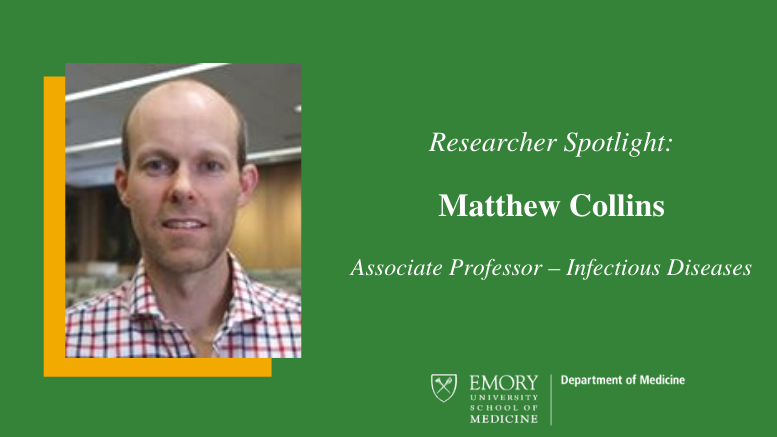What is your professional background?
I trained in Internal Medicine at Boston Medical Center (“Boston City”) and then did an Infectious Diseases fellowship at the University of North Carolina, Chapel Hill. I completed a combined MD/PhD program at the Medical College of Georgia and University of Georgia, studying T cell responses to the protozoan parasite Trypanosoma cruzi for my doctorate work. During fellowship, I joined a dengue research group just before the Zika epidemic was announced in Brazil in 2015, so I learned a bit about virology (expected) but also what it’s like to be “in the field” during the emergence of a previously obscure pathogen (unexpected).
In what division do you work, and who is your mentor?
I’m in the Division of Infectious Diseases. Junior faculty development activities at Emory have taught me that mentorship “takes a village,” and I’m grateful to have access to many people here with diverse expertise that generously take time to invest in me. Aravinda de Silva continues to be my mentor since my fellowship, where I discovered my current research interests.
Briefly describe your research. Why is it important?
Arboviruses are a major global health problem with potential to cause pandemics and severe clinical disease as was seen recently with Zika. Dengue alone infects 400 million people each year and billions live in areas that put them at risk. We work across the translational spectrum to better understand human immunity and epidemiology of arbovirus infection. Our work currently focuses on antibody responses to flaviviruses such as dengue, Zika, and yellow fever. In addition to learning more about how the immune system works, we seek to apply our science to vaccine development, improving and evaluating serodiagnostic tests, and assessing epidemiologic endpoints of clinical trials testing interventions to reduce arbovirus transmission.
What do you like most about Emory?
I think Emory does a very good job at fostering interdisciplinary research. For example, through internal seed grants, I have had the opportunity to work with Dr. Gonzalo Vazquez-Prokopec in Environmental Sciences, who has become a collaborator, friend and mentor for me. I don’t think this fun and productive connection would have easily happened at many other institutions.
What is your favorite movie or TV show?
“House” episodes have been a guilty pleasure since medical school; otherwise, it doesn’t get any better than “Good Will Hunting.”
What do you like to do in your spare time?
I like to walk on trails in the Appalachian Mountains with my family.
What is a fun fact about you?
I speak Spanish fairly well for a gringo – it has been useful in our research collaborations, and it is incredibly rewarding to experience the change in an exam room when a Spanish-speaking patient suddenly becomes much less apprehensive about seeking medical care and opens up about their life and illness.


Be the first to comment on "Researcher Spotlight: Matthew Collins"